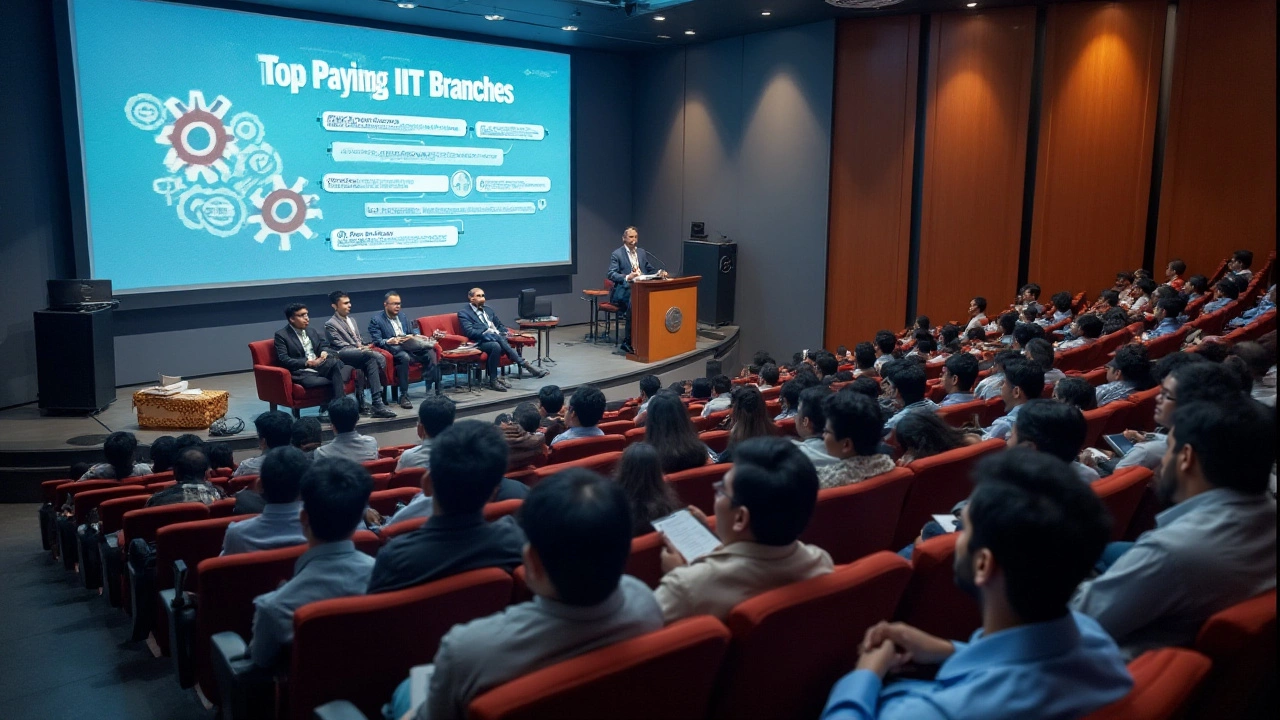
The landscape of career opportunities for IIT graduates is diverse and dynamic. For many students aiming to study at the prestigious Indian Institutes of Technology, one compelling factor is the potential salary associated with different branches.
Diving into current salary trends can be enlightening for those still contemplating their choices. Even though financial potential shouldn't be the only criterion, it's certainly an important one, often influencing decisions significantly.
So which branches tend to lead to the highest paychecks? With a mixture of tradition, emerging markets, and individual excellence, some branches set themselves apart from the others.
This article explores those pathways, providing a comprehensive overview to help aspirants map out their future with knowledge and confidence.
- Understanding IIT Branches
- Salary Trends in Different Branches
- Branches with the Highest Salaries
- Influencing Factors of Salary Variations
- Preparing for a High-Salary IIT Branch
- Choosing the Right IIT Branch
Understanding IIT Branches
Diving into the world of IIT branches can feel like exploring a universe of possibilities, each one with its own distinct allure and potential. The Indian Institutes of Technology, renowned globally for their academic excellence, offer a wide spectrum of engineering and technology courses, which can significantly shape a student's future career path. From the traditional and highly esteemed fields such as Electrical and Mechanical Engineering to the cutting-edge realms of Computer Science and Robotics, each branch comes with a unique set of skills and experiences.
Many aspirants are naturally drawn to branches based on their passion or interest areas, while others may weigh factors like job prospects and potential salaries. A crucial aspect to consider is the continual evolution of certain branches to meet the global technological advancements and industry demands. For instance, the realm of Computer Science often garners immense interest due to the boom in software and tech industries, driving substantial salaries and varied job roles. Quoting a report from the National Institutional Ranking Framework, "Students of Computer Science have, for the past decade, seen the highest placement rates and the broadest range of opportunities."
Students are often presented with core branches such as Mechanical, Civil, and Electrical, which have stood the test of time in terms of relevance and demand. Simultaneously, newer branches like Artificial Intelligence and Data Science are emerging, riding the wave of digital transformation. Each branch curriculum is designed to equip students not only with technical knowledge but also with critical thinking and problem-solving capabilities, nurturing innovation and adaptability in the face of technological disruptions.
Understanding the nuances of each branch can be augmented by exploring the curriculum details, faculty expertise, and the infrastructure available at various IITs. Often, branches within IITs collaborate with industries to develop practical and research skills in students. Potential candidates can also look into past placement statistics, which provide insights into hiring trends, recruiter preferences, and expected pay scales across branches. The interdisciplinary nature of learning at IITs also encourages students to take electives outside their core branches, enhancing their expertise and versatility.
Deciding on a branch is a pivotal step and can be overwhelming, but it’s key to remember that passion and persistence often pave the way for success, regardless of the choice. Finding the right fit requires a balanced approach—considering academic interest, career goals, and industry trends. With a profound understanding of branches and their implications on future prospects, aspirants can confidently make informed decisions that align with their ambitions and skills.
Salary Trends in Different Branches
As ambitious students weigh their options, understanding the salary trends across various IIT branches becomes pivotal. With the rapid pace of technological advancements and globalization, certain branches have witnessed a remarkable upswing in salaries. The branches that consistently draw attention include Computer Science, Electronics, and Electrical Engineering. Their correlation to burgeoning industries like AI, software development, and renewable energies makes them exceedingly lucrative. Over the last few years, computer science graduates have frequently reported the highest offers, some going up to seven-figure salaries in multinational corporations such as Google and Facebook. This trend signifies the rising demand for tech-savvy professionals in today's digital economy.
In an equally impressive stride, the field of Electronics is also seeing a sharp uptick in salary offers, driven by its applications in everything from household gadgets to complex systems like avionics. Students from this branch are seeing offers that are on par with Computer Science graduates. The need for renewed energy solutions and smart grids is adding to the allure of the Electrical Engineering branch. Graduates with specialization in this domain are tapping into diverse sectors, including the automotive industry and energy firms. With more companies pledging sustainability, the demand for expertise in electrical systems is only expected to grow. As an IIT alumnus quoted in a recent survey, "The interdisciplinary scope in Electrical Engineering offers unbounded opportunities for innovation and career growth."
"With the current trends in technology and R&D, the role of engineering branches like Computer Science and Electronics is ever-evolving. They aren't just about coding or chips anymore; they are about shaping future societies." - Dr. R. Khanna, IIT faculty.
It is important to note, however, that while these branches generally offer higher starting pays, other branches like Mechanical Engineering and Civil Engineering also promise significant earnings once specialized skills and experience come into play. Industries such as automotive, aerospace, and infrastructure development rely heavily on talents from these fields. Additionally, pursuing niche areas within these branches, such as robotics in Mechanical or seismic engineering in Civil, has proven beneficial for many seeking high compensation packages. Understanding these trends helps aspirants to strategically plan their educational journey by aligning their interests with market demands.
A look at salary packages offered during campus placements in 2024 across IIT branches:
| Branch | Average Salary Package (INR) |
|---|---|
| Computer Science | 22 Lakhs |
| Electronics | 20 Lakhs |
| Electrical | 19 Lakhs |
| Mechanical | 15 Lakhs |
| Civil | 14 Lakhs |
Though these numbers are enticing, it's essential to remember that salary trends are not static. Students need to continually upgrade their skills and stay abreast with industry developments. The balance of practical experience, adaptability, and domain expertise is indispensable for leveraging the handsome pay packages these branches offer. Aspirants should use such insights as a guide but not the sole determinant of their career choices. After all, a fulfilling academic journey and career encompass more than just monetary rewards.

Branches with the Highest Salaries
One of the most asked questions among aspiring IIT students revolves around which engineering branches boast the highest salaries. The potential earnings not only depend on the branch but also on the industry demand and individual capabilities. However, certain branches have consistently shown higher salary packages, often driven by current global technological trends.
At the forefront, the Computer Science and Engineering (CSE) branch remains immensely popular. CSE graduates often find themselves at the heart of the tech industry, which is known for its generous pay scales. With technology giants like Google, Microsoft, and Amazon continually in search of fresh talent, salaries in this field often soar. This aligns with a quote from Sundar Pichai, CEO of Google, who once noted,
"As we evolve, our reliance on young, energetic minds from prestigious institutions like IIT becomes essential to address ever-growing tech demands."
Another lucrative branch is Electrical Engineering, which appeals to those fascinated by the intricacies of electronics and electrical systems. With the recent global shift towards sustainable and renewable energy, the demand for skilled electrical engineers has surged, nudging salaries upwards. Similarly, Mechanical Engineering continues to be a stalwart for high earnings, especially in sectors like automobile, aerospace, and manufacturing, where innovation is key.
Civil Engineering has also witnessed an upswing, propelled by rapid infrastructure development around the world. While often underrated compared to its counterparts, some of the largest firms in construction and urban planning offer attractive packages for civil engineers. In scenarios where timing and location are paramount, civil engineering's appeal remains unchallenged.
Finally, we can't overlook the field of Data Science—a modern amalgamation of engineering, mathematics, and business. Although not a traditional branch, it attracts IIT graduates from various disciplines eager to dive into the world of data analytics. The statistics show that data science-related roles can easily command six-figure salaries, reflecting the industry's recognition of data as the new gold.
For a comprehensive understanding, let's consider the salary data for these top branches:
| Branch | Average Starting Salary |
|---|---|
| Computer Science & Engineering | $120,000 |
| Electrical Engineering | $100,000 |
| Mechanical Engineering | $90,000 |
| Civil Engineering | $80,000 |
| Data Science | $150,000 |
These figures represent an average and can vary significantly based on location, experience, and the prestige of the employer. As industries worldwide adapt and change, these figures may shift. However, the prestige and rigor of IIT often grant its graduates a strong bargaining position, securing them excellent initial offers from prestigious companies globally.
Influencing Factors of Salary Variations
In the vibrant ecosystem of Indian Institutes of Technology, the trajectory of one's career often hinges on the branch of study they choose. While passion plays a significant role, understanding the elements that affect salary variations is crucial for students aiming for a lucrative career. One of the primary influencers is the demand and supply dynamics of the job market. With the tech landscape expanding globally, branches like Computer Science consistently attract hefty pay packages, compared to traditional cores like Civil or Chemical Engineering. This is not to say that one is superior; it merely reflects the market's current demands.
Technological advancements and industry trends also dictate salary patterns. In recent years, we've witnessed a significant boost in salaries within the AI and machine learning sectors. It's not just the technical prowess but the ability to adapt and leverage new tech trends that make candidates from these fields more desirable. The job market values innovation, so branches that align closely with these advancements naturally see higher salaries.
Alumni network and industry connections form another crucial factor. IITs are celebrated for their extensive alumni networks, and certain branches have stronger ties with industries that pay top dollar. Networking and mentorship opportunities can significantly impact starting salaries. Prominent alumni might favor placement drives in their respective sectors, influencing the demand and offer cycle during campus recruitment.
The IIT Madras website notes, "Our alumni's stellar achievements greatly contribute to the global employability of our graduates."
The institute's location might also subtly influence salary packages. IITs situated in tech hubs, such as Bengaluru or Hyderabad, often offer graduates more opportunities, thanks to local industry ties and higher living costs. Though not a decisive factor, the geographical context can play a supportive role in negotiation spaces.
Finally, individual skills and accomplishments, often overlooked, can sway salary outcomes. Students who supplement their education with certifications or internships relevant to their chosen branch can stand out. Being proactive about personal and professional development shows employers a candidate willing to go the extra mile. Employers are constantly on the lookout for adaptable, skilled graduates who can lead in a variety of situations.
In essence, navigating through the myriad of influencing factors for salary in the world of IITs necessitates a thorough understanding of these variables. Focusing on personal growth, staying updated with industry trends, and making the most of alumni networks can serve as valuable strategies for budding engineers aiming for well-paid positions.

Preparing for a High-Salary IIT Branch
The journey to securing a position in a high-salary IIT branch begins long before admission. It starts with thorough preparation and an understanding of the entrance examination and its requirements. IIT JEE is renowned for being one of the toughest exams, testing students on various scientific and analytical concepts. To stand out, aspirants must cultivate a disciplined approach to study, balancing conceptual knowledge with practice. This often involves creating a structured timetable that includes dedicated hours for each subject and leveraging online resources, mock tests, and group studies to enhance learning.
Choosing the Right Resources
A key aspect of preparation is selecting the right study materials. With myriad books and online content available, it's easy to feel overwhelmed. A focused approach is vital. Many top-rankers suggest using resources like 'Concepts of Physics' by H.C. Verma for physics and 'IIT Mathematics' by M.L. Khanna for mathematics. Engaging in coaching classes can also be beneficial. Institutes like FIITJEE and Allen provide test series and resources tailored for success in IIT. Using these resources effectively can make a significant difference, boosting both confidence and performance.
Time Management and Revision
Successful candidates often emphasize the importance of time management and consistent revision. Breaking study sessions into short, focused periods with regular breaks can enhance retention and prevent burnout. An effective revision strategy might involve summarizing key points and practicing problems daily. Revisiting complex topics multiple times ensures a deeper understanding, an approach endorsed by countless educators and successful IITians. Keeping a healthy balance between study and leisure is crucial, as mental well-being can greatly impact performance on such a demanding exam.
"It's not the hours you put in your study, but the study you put in the hours." — Anonymous IITian
Mock Tests and Real-Time Evaluation
Mock tests mirror the actual exam conditions and are indispensable tools. By simulating the examination environment, aspirants can hone their skills in time management and pressure handling. Evaluating performance in these tests provides insights into strengths and areas requiring improvement. It's advised to analyze every test thoroughly and seek guidance wherever doubts persist. Consistently practicing full-length papers can significantly boost one's ability to tackle the actual examination with confidence, according to both educators and alumni.
Understanding Branch Preferences
An integral part of preparation involves researching different **IIT branches** and understanding salary prospects. Current trends indicate that **Computer Science** and **Electrical Engineering** consistently offer lucrative packages due to their high demand in the tech industry. Therefore, aligning one's preparatory focus with these interests can be beneficial. However, aspiring engineers should remain open to other branches promising high growth potential, as the industry is ever-evolving. A well-informed choice can maximize not only salary but career satisfaction too.
Choosing the Right IIT Branch
Selecting the right branch in IIT is akin to setting the course for your professional journey. It's a decision that requires careful consideration since it opens doors to specific industries and roles. When choosing a branch, think beyond initial salary figures, as career satisfaction and passion for the subject can be equally rewarding. Consider your own interests along with the market trends in the industry you wish to enter. Frequently, students lean towards branches like Computer Science or Electrical Engineering due to their high demand and lucrative salary packages, but other branches offer unique opportunities and align well with different interests and skills.
Understanding your own strengths and weaknesses can play a crucial role in this decision-making process. If you're someone with a profound curiosity about how things work, branches like Mechanical or Civil Engineering might be intriguing. However, if programming and working with software systems excite you, pursuing a specialization in Computer Science might be beneficial. It's essential to evaluate the curriculum, future career prospects, and, most vitally, your passion for the subject. Branches like Aerospace Engineering offer the allure of working with cutting-edge technology and can be incredibly fulfilling despite being less conventional.
A 2018 survey by 'Naukri.com' highlighted that Computer Science graduates from IIT were receiving average annual packages well over 15 lakhs INR, which signifies the high demand for tech experts in the industry. Nevertheless, it's critical not to get swayed just by numbers. Economic conditions, technological advancements, and evolving industries shape job landscapes continuously. An informed choice today could lead to substantial gains, but an informed choice aligned with enthusiasm and capability often results in the most satisfying and successful careers.
"Passion is something that will not only drive you to ace your academics but also to excel in the professional world," notes Anil Sahasrabudhe, Chairman of AICTE.
Conduct thorough research on individual IIT campuses and the unique opportunities they offer. Student exchange programs, industry collaborations, and placement records are some factors warranting consideration. Engaging with seniors or alumni from your preferred IITs can provide first-hand insights into campus life and the actual study experience of different branches. With the changing dynamics of industries, diversifying your knowledge by taking electives in interdisciplinary fields can also widen your career scope considerably.




